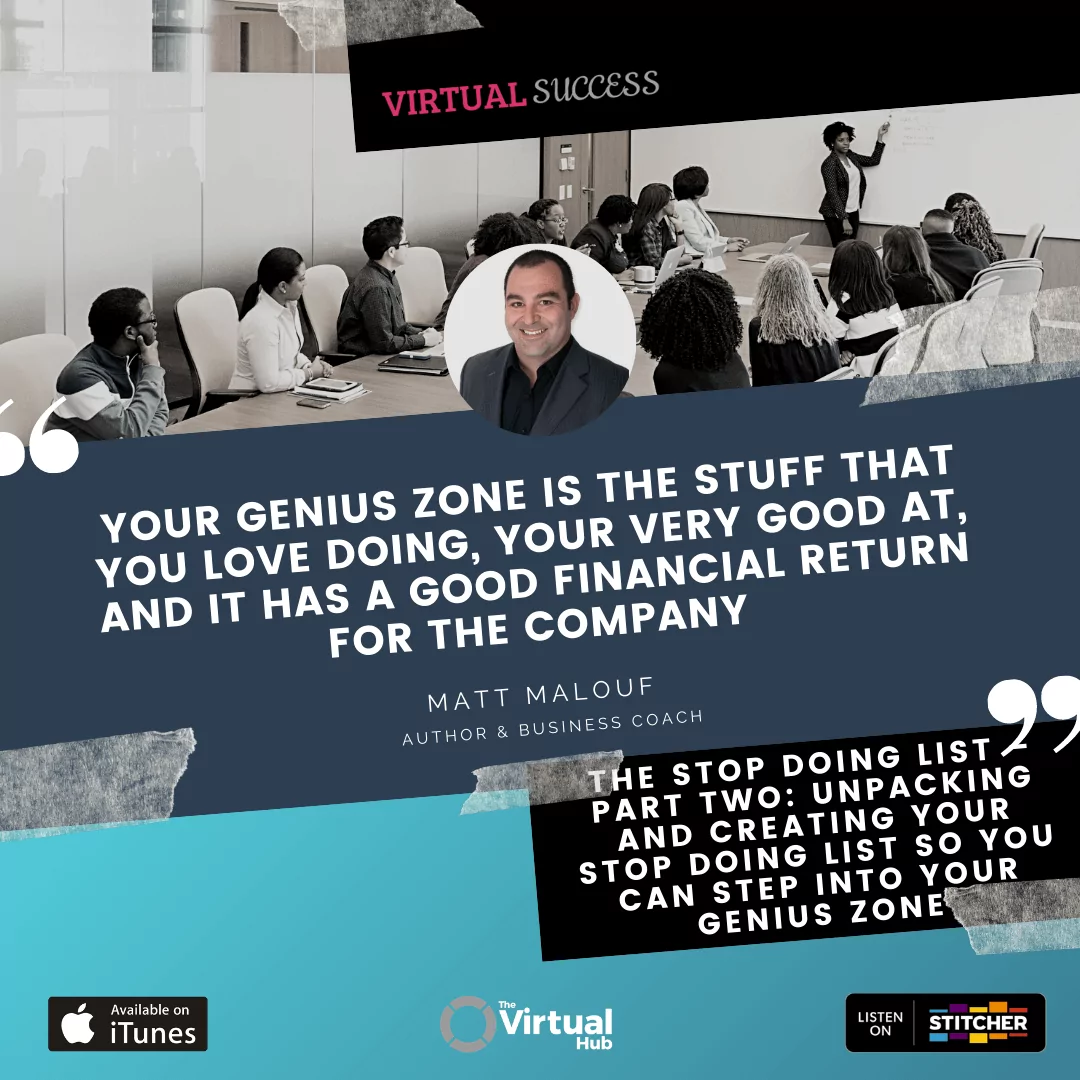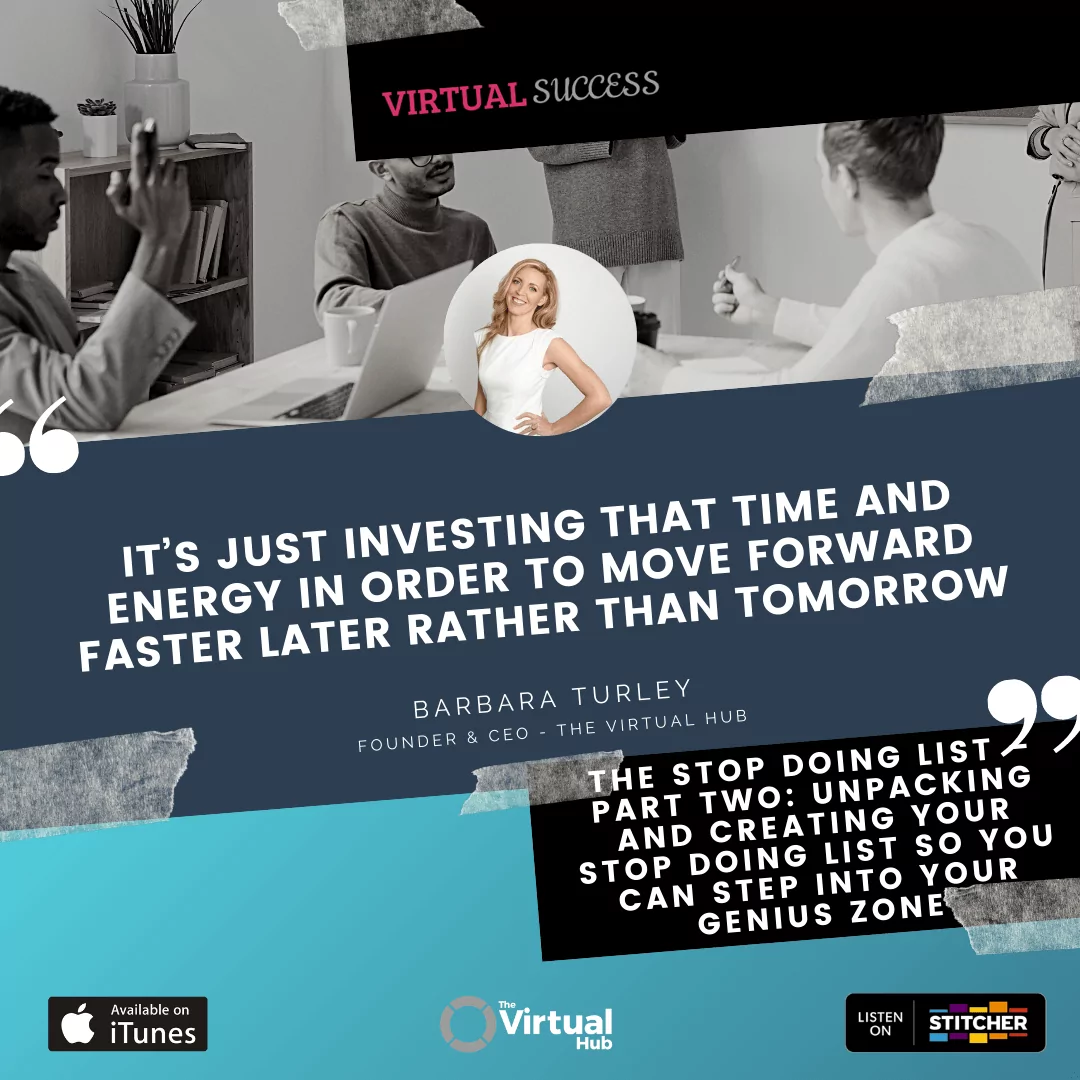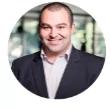The Stop Doing List – Part Two: Unpacking and Creating Your Stop Doing List So You Can Step Into Your Genius Zone
Want the transcript? Download it here.
In the second episode of our three-part special on The Stop Doing List book, author Matt Malouf talks about the key to understanding where you are spending your time and how to categorise those tasks to get clear on where you should be spending more time – your Genius Zone.
During this episode, Matt explains that the more time you spend in your ‘genius zone’, the more you’ll love your business, the more profitable your business will be and the more freedom you will have long-term.
Some of the areas covered are:
- The importance of determining the value of your time – your hourly rate – and the process to do so
- Understanding your genius zone – those tasks and activities that you love doing, that you do really well and that have a positive financial return to you and the company
- How to filter your tasks through the focus funnel in order to determine which tasks you should, delegate, automate or eliminate to create your ultimate Stop Doing List
In this episode:
02:30 – Unpacking and creating your Stop Doing list
03:55 – Understanding your genius zone
08:00 – Calculating your hourly rate
10:25 – Determining your opportunity cost
12:35 – Wrapping things up
Let us know what your key takeout has been from this episode and join the continuing conversation over in the Virtual Success Facebook Group.
Resources mentioned in this show:
The Stop Doing List – www.stopdoing.com.au
Barbara: Hey everyone and welcome back to the Virtual Success Show where I’m joined by my co-host, Matt Malouf. How’s it going Matt?
Matt: It’s going well Barb, and yourself?
Barbara: Really good, I’m very excited about today’s show, and to delve into part two of our three part series on your The Stop Doing List book, which has just been a pivotal book for me to read recently. All the things that- I thought I knew lots about this but I’ve just learned so many things from delving into your book again.
So guys, last show we did was part one of The Stop Doing List, where we talked about the mindset- and it’s such a detailed show on the specific steps and the specific mindsets that you need to get into in order to actually stop doing, and then in today’s show we’re going to talk about actually unpacking and creating your stop doing list, which- one of the key questions we get at Virtual Angel Hub is “how do I know what to put on my list to give a VA?” So it’s a really big question that we get asked, and I’m sure Matt, you get asked this question all the time as well.
Matt: Absolutely and also those that are wanting to grow their companies, this is the starting point. Everyone’s looking for what I need to do, I need to do more, do more, but unless you let go of some of these things first, and utilise a virtual assistant, or even employing technology and the like to help you with this, it’ll just burn you out.
Barbara: Yeah, and you don’t have the space and time to strategise and move forward. You actually need to free up your time effectively first, it’s like the number one thing you need to do, I think, before you start trying to grow and scale.
So, now, we did a show- a couple of shows back we did a show that we delved into quite a lot of what this second part of the book talks about so Matt, can you just run through- I think it was the show called, “Think You’ve Only Got Five Hours to Delegate? Think Again.” So it’s a great show on how to figure out how much you’re actually doing that you need to stop doing.
So Matt, can you give us- just kind of run through the key steps in this part of the book.
Unpacking and Creating Your Stop Doing List
Matt: Absolutely. So, this part of the book is really about you’re starting to understand where you’re spending your time, and then how to categorise those tasks to get clear on where you should be spending more time. And so, the only way to start that process is to get absolutely clear on your hourly rate, getting clear on the value of your time. If you actually go to the StopDoing.com.au website, you can download the ultimate stop doing list tool, and it actually steps you through this.
So what we recommend is that you do a time log for a minimum of two weeks to get clarity on where you’re spending your time. You then calculate your hourly rate, so you’ve got a yardstick against which to measure where you should or shouldn’t be spending your time. And then this section of the book talks about the- getting into what we call your genius zone, and your genius zone are those tasks and activities that you love doing, that you do really, really well and have a positive financial return to you and the company.
And, it steps through and says the more time you spend there, number one the more you’ll love your business, number two the more profitable your business will be, and number three the more freedom you will have long-term.
Understanding your Genius Zone
And so, section two of the book or part two of the book helps you start to understand what your genius is and there’s four levels there. There’s the genius, the excellence, the competence, and the incompetence and I won’t go through it in detail, it’s all in the book I want you to go through it. What it then helps you do is- it’s all well and good to sit there and go “okay well, here’s a list of tasks and here’s what my time is worth, what do I do now?” And then, in the last show we talked about the focus funnel, we talked about putting your tasks through the focus funnel, which is a methodology from Rory Vaden’s book, Procrastinate On Purpose. And he talks about if a task comes in, you ask yourself, “Can we eliminate this? Can we automate this? Or can we delegate this?” And if it gets through those three layers then the choice is am I going to focus on it, or am I going to procrastinate and do it later?
And so in order to get clear on what you need to stop doing, you need to filter your tasks through the focus funnel and then I think it gets really, really interesting, because again I think that up to that point is very straightforward and very logical, but this is where I think a lot of stop doing falls over, and on the tool we talk about, and ask you the question, ” are there special skills required for the task?” And I think Barb, you probably find this with assigning virtual assistants to people is that, people aren’t clear on the special skills required so they- that whole myth of the super VA comes back again. My VA can do everything, yet they don’t necessarily have the special skills required to do the task that you’re asking of them.
Barbara: Yeah, and sometimes, it’s very interesting- sometimes people say to us- we highlight that in the interview process and through the thing, and clients will say to us, “oh that’s fine, yeah, I know they’re not trained in that, that’s okay, I’ll do some work with them.” And then they come back a month later and complain bitterly that the VA’s not able to execute on the thing that we just discussed. And we’re like, “That’s because you need an expert. You need a graphic designer.”
Okay, our VA’s can do some Canva images for social media and all that stuff, but they can’t design a brochure, because that’s actually a graphic designer job, or they can’t build a website, that’s another one we get quite a lot. Like, you know, build a website in WordPress, yeah, you could just get a template and sort of drag a few pieces in there, but you’re not going to get a quality piece of work- and if you’re happy with that that’s fine, but you can’t blame the VA for that, or us because we didn’t train on it. So we see that all the time.
The other one I see a lot, Matt- it’s funny I loved that you said, “your genius zone is the stuff that you love doing, your very good at, and it has a good financial return for the company.” Because what we see a lot of people doing is maybe they love doing social media, they are very good at it, but does it bring a financial return to the company if they’re spending all their time just creating Canva images with tips and quotes on it?
So this is this whole running back- we talked about the comfort zone in the last show, part one of the book, and I sometimes feel that’s people saying, “well my genius zone is X” but they’re not considering the financial return piece. So, just because you’re good at it and you love to do it you’ve got to ask yourself though is it a good use of your time from a business perspective.
Matt: Absolutely, absolutely. Until you get your company to a point where … Others can do maybe the most positively financially returning tasks and you can do whatever you choose to do- but I mean really until a company’s probably turning over somewhere between five and ten million dollars a year you can’t afford the luxury of that often.
Barbara: Yeah, you’re working.
Matt: That’s right.
Calculating your Hourly Rate
Barbara: So what I love about your tool is that it actually- so it helps you to identify what is your genius zone, but also it helps you to identify another question I get all the time is, “How do I know what my hourly rate is?” So your tool helps you to get to that realisation of what your hourly rate is and therefore what is the financial return of you spending your time on X, Y, or Z.
Matt: Absolutely.
Barbara: Even if you love it.
Matt: And what the tool will do, too, is if a task can be done for an hourly rate of 75% or less of your hourly rate, then it recommends that you stop doing that task because the financial gain is not there, your time is better spent in your genius zone doing tasks that return your hourly rate or above.
Barbara: And you know I love that this ties us back to the mindset piece because I can imagine so many people will avoid delegating that even though they’ll know that their hourly rate is higher and they should because it means that they themselves have to go out and sell more, or have to go out and actually see their own value. Because obviously I think that’s the running back to the comfort zone thing that we talked about in part one of this series. There’s an up-levelling involved in saying. “Well I’m not going to do this stuff anymore, and therefore what am I going to do with my time?” Would you find that in your coaching?
Matt: All the time. People have the desire to either make more money, or spend more time with their partner, their loved ones, etc. and then when you create that time for them they’re like, “Well, I don’t really know what to do. I’ve not done that.” So it’s actually really, really interesting.
Barbara: Yeah, I can imagine people would fall into that, and like I said because it usually involves you should be spending your time on scaling, growing, out doing marketing, sales, talking, whatever it is that your- the face of the business or whatever’s going to be doing, but that can push you out of your comfort zone. So, you’ve got to go back to stage one again and think about how far outside of my comfort zone am I willing to go right now in order to grow my business?
There’s a whole- we’ve circled back to part one of this again.
Determining your Opportunity Cost
Matt: Absolutely. And again as you step through as well it calculates an opportunity cost. If you keep doing the task, it will show you a per annum calculation of what you’re actually losing or potential loss as opposed to getting someone else to do that task at a lower hourly rate. And again, this is to reiterate the investment versus cost mindset as well.
Barbara: You know, a client of ours did this exercise- just separate from this I recall a conversation I had about a year ago, and he had calculated if- he’d never actually done that exercise before and then he got a VA through us and he calculate that actually it was $247,000 per year that he was- the opportunity cost of him running himself into the ground trying to do everything. Now, he had tried to get a VA before and it hadn’t worked, and failed, and he came to us and we taught him how to do it properly, and we got him a great person, and put all the support systems in places, and his business just totally took off after he did this exercise. Because it gave him the hunger, you see, he thought, “oh my God, look at all of this money I could be making if I actually get my act together, stop doing this stuff and get after the real stuff. So transformed him completely, yeah. So it’s well worth doing this.
Matt: And the tool will actually make that really, really clear to you. Really clear…
Barbara: So StopDoing.com.au is where you can download that tool. Is it- obviously the resources section of that website?
Matt: It is, yes it is. And, it’s very simple and straightforward…
Barbara: And it’s free, sorry it’s free we should tell them it’s free!
Matt: And the book steps you through the theory behind it as well.
Barbara: And we’ll actually have a link- there’s a link below this show to the site where you can actually download that, and obviously the book- yeah the book’s great on this area actually because it steps you through that whole genius zone stuff as well.
So, Matt, to wrap up, anything else- before we lead into part three of the book, which is the next show, anything you just want- any concluding points on this part of the book?
Wrapping Things Up
Matt: One thing that the tool asks as you go through is, “Is there a system for the task?” And often when I’m working with clients and they starts saying no, no, no, no, no all the time, it starts getting them down or they start thinking that they’ll never get it off their list.
Be okay with that because bringing in a strong virtual assistant that understands that’s the lay of the land and that part of their role is to help you build the systems, and as long as you’re clear on that and you’re patient with them about that, you can still move to the next stage of stop doing all of these tasks, it’s just going to take you a little bit more time.
Barbara: Yeah, like we talked about before, sometimes people when they get a VA- we often find they want to hit the ground running on day one. And we sort of go even if we were to give you a highly- even if I was to give someone off my team, highly experienced, knows exactly what to do to get in there, it would still take two to three months because it’s a new business, all the IP is usually in the head of the business owner. So, that takes time to get through that little hump, but it just- you’ll fly after that. So again it’s just investing that time and energy in order to move forward faster later rather than tomorrow. That’s a mindset thing of course, too.
Matt: Absolutely. So it’s taking the time- and it’s what you were saying earlier about slowing down to speed up and actually doing the work here to give you the clarity on whether you’re ready to stop doing or not and also preparing to be able to then work with a virtual assistant from Virtual Angel Hub or someone from within your existing team to start to delegate and move these tasks to them.
Barbara: Absolutely. And that brings us on to the next show that we’re going to do which is probably- well all of these parts are really critical, but the interesting one about the next part of this series is actually how to stop doing, because so many people- and I see this all the time, you know, clients will come in and be like, “But I did everything you told me to do and we built the systems, we’ve got the processes, we’ve put everything down.” And they’re still struggling, and it’s because they haven’t figured out this final piece, which is so important, is the how to stop doing, because there actually is a whole process for that as well.
So we’re going to delve into that in the next show as the final piece of the book.
Matt: Absolutely and I’m going to step you all through exactly how to stop doing and what’s holding you back from getting others to do these tasks for you. So please be sure to tune into the next show.
But also, please feel free to give us- we’d love your ratings and comments about the show. We’ve also got a private Facebook group. So, join the conversation with us and we’d love to hear more about what would you like us to talk about on this show? This show is about you, we want to give real life experiences and help you succeed with your virtual team. So, we’d love your input, love your feedback, and until next time, Barb thank you so much I’m really enjoying this three part series and looking forward to the next part.
Barbara: Yeah thanks Matt, me too. See you guys.
Matt: See you.
The Hosts
 Matt Malouf
Matt Malouf
Matt Malouf is a passionate business coach, speaker, author and entrepreneur on a mission to help entrepreneurs around the world break the shackles of mediocrity and reach new levels of personal and business success.
 Barbara Turley
Barbara Turley
Barbara Turley is the Founder & CEO of The Virtual Hub, a company that specializes in recruiting, training and managing superstar ‘Virtual Assistants’ in the social media, digital marketing and systems automation space.



 Matt Malouf
Matt Malouf Barbara Turley
Barbara Turley